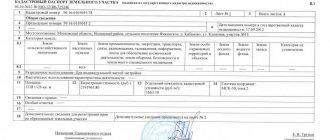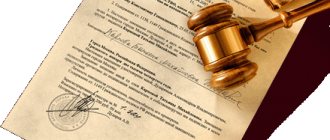Thinking about who and how property will be transferred after death is an unpleasant experience. However, many people approach this problem with full responsibility. And they do it right. Since there are many subtleties and pitfalls in matters of inheritance and transfer of rights to real estate.
In this article we will tell you about these nuances, and also give an answer to the most common question: “What is the best way to leave/transfer real estate to children: through a gift or a will?” Well, since we have a portal about country real estate, we will look at the intricacies of such transactions using examples of dachas and plots.
Dacha donation agreement - rules for registration
Mostly the participants in the gift transaction are relatives, but the law allows the transfer of any property, including real estate, to strangers as a gift. The procedure for concluding a transaction in both cases is identical, with the difference that relatives will not have to pay tax.
The procedure for registering a dacha donation transaction includes the following steps:
- Drawing up and signing of an agreement by the parties.
- If desired, the deed of gift can be notarized.
- Submission of a package of documents to Rosreestr for entering data into the Unified State Register.
- Obtaining an extract from the Unified State Register on the transfer of ownership of the dacha.
In the case where the parties are related to each other, this is certainly indicated by a special clause in the contract. This fact is confirmed by a document included in the list of mandatory annexes to the contract (marriage certificate, birth certificate, etc.). The list of persons recognized by law as close relatives is given in Art. 14 of the RF IC and clause 18.1 of Art. 217 Tax Code of the Russian Federation:
- Children (even adopted ones) and parents (adoptive parents).
- Grandfathers and grandmothers and their grandchildren (including adopted ones).
- Brothers (including half-brothers).
If the parties are not included in this list, then after completing the registration of the transaction, the recipient will have to pay tax (personal income tax).
Features of drawing up an agreement when refusing notary services are as follows:
- It is impossible to draw up a document, despite its simple written form, in an arbitrary manner. When registering it, it will be checked for compliance with legal requirements, and if errors are found, it will be returned to the applicants for correction. It is better to immediately contact a lawyer for help in formulating a deed of gift.
- The number of copies is equal to the number of participants in the transaction (there may be several donors and also recipients), plus one more copy for transfer to the Registration Chamber. In the simplest case, when there are only two sides, three copies will be required.
- The complete transfer of ownership of the dacha will be completed only after the parties sign a transfer deed, which describes in detail all the property being donated (land, house, other buildings).
What is more profitable and easier to leave a dacha: by will or deed of gift?
Despite all the problems of registering an inheritance, it is quite difficult to answer this question unambiguously: everything is purely individual and depends on the situation. And each of these methods of transferring rights to real estate has both positive and negative sides.
If we consider each of the announced methods of transferring real estate from the financial side, then with none of them will it be possible to avoid additional expenses. For example:
- Just drawing up a will for a dacha will cost at least 1-3 thousand rubles, which must be paid to a notary;
- Payment of state duty is required (on average 200-400 rubles);
- A certificate of inheritance rights cannot be obtained for free. The amount of expenses directly depends on the proximity of the relationship. So, if we are talking about a close relationship, to obtain a certificate the heir will have to pay up to 100,000 rubles (0.3% of the value of the property according to the BTI assessment), while in the case of a distant relationship this amount can reach up to 1,000,000 rubles;
- Next, after the certificate is in the hands of the heir, it is worth taking care of registering ownership rights. Here you will need to pay the state fee again (about 1,000 rubles).
And only by paying all these expenses can you finally enter into inheritance rights. Contrary to popular belief, there is no need to pay income tax (personal income tax) in this case, and the degree of relationship has nothing to do with it.
As for the gift agreement, which is not subject to mandatory notarization, if it is drawn up correctly (with the involvement of a realtor or lawyer), you will have to pay more than 5,000 rubles. After writing a gift agreement, it is subject to registration with Rosreestr; registration is again not free and will cost about 2,000 rubles (one thousand per agreement).
What kind of agreements are we talking about? Two sets of documents are submitted to Rosreestr. One is for registering ownership of real estate for the new owner, the other is for registering a gift agreement. Another expense item in this case is the payment of personal income tax, which, as noted above, does not exist with a will. However, this tax does not have to be paid to close relatives.
How many people can you give a dacha to?
The question is not idle, since often we are talking about donating property from parents to children or grandchildren. The number of recipients can be any. In this case, the deed of gift must describe very precisely:
- To whom exactly the gift is being given, list everyone by name, indicating their passport details.
- Who gets what share of the house and land?
- On what rights will the new owners own real estate in the future - on the right of common (joint) or shared ownership (with or without allocation of shares in kind).
Afterwards, each of the recipients pays or does not pay tax depending on the degree of relationship with the donor. Registration of a deed of gift in Rosreestr is possible only in the personal presence of all participants in the transaction or their representatives by proxy.
There can also be several donors. For example, parents who jointly own a dacha can give it along with the land to their only child.
Inheritance of several real estate objects
You can inherit any real estate: dachas, cottages, apartments, land plots. An exception to the rule established by law, according to which, for example, country real estate, land and water (ponds and lakes) are inherited, is only something that is determined by the personal characteristics of the one who transfers the inheritance. As an example - plans, religious beliefs, the need to pay alimony.
But the rights of the heir or heirs regarding membership in commercial and non-profit associations may well be inheritable. Let's say we are talking about a garden plot - real estate here is most often small country houses - you can inherit it, and the process of transferring rights does not take much time.
The plots for construction (individual housing construction) purchased by the testator are also inherited - the problem is only by whom and to what extent (share). In cases where difficulties arise in determining who should inherit a particular piece of real estate, it makes sense to turn to the Civil Code of the Russian Federation. It spells out in sufficient detail all the instructions on the right of priority in the matter of receiving an inheritance in the form of real estate.
However, it should be taken into account that there are some restrictions on the inheritance of country real estate: they are stipulated either by the charters of commercial and non-profit organizations, as well as by special legislative acts - created precisely to describe special cases of inheritance.
Thus, problems may arise when trying to transfer the land around the house to children by will, if it was only leased and not owned. In this case, if the owner had other relatives besides the heir, you should be prepared for the fact that registering an inheritance could turn into a real headache.
Therefore, before you start registering an inheritance for a dacha or plot of individual housing construction, SNT or private subsidiary plots, it is worth carefully studying the Civil Code, in the part where inheritance issues are considered.
What documents will be required?
In the event that the parties decide to independently register the deed of gift, they will need to collect the following package of documentation:
- Passport for each participant in the transaction (all pages).
- Document. Confirming the donor's ownership of the dacha and land.
- A gift agreement formulated taking into account all regulatory requirements.
- Receipt for payment of state duty.
- Application to Companies House.
- If one of the parties to the transaction is a legal entity, then an extract from the Unified State Register of Legal Entities is provided for it.
land donation agreement
If the parties decide to trust a notary, then they will additionally need:
- Cadastral passports for dachas and houses.
- An extract from the house register indicating the number of registered persons.
- Explication.
The notary, based on the documents provided, will determine the real value of the property, and then, based on this data, will calculate the cost of his services.
Problems of inheritance of dachas and plots
The question of whether to leave the dacha as an inheritance or transfer it to the children in some other way would not arise in principle, if not for the mass of problems that people face every now and then when registering this very inheritance. In addition to a lot of hassle and completing all the paperwork for months, often the division of the property of the deceased, unfortunately, often turns into a real battle between relatives. Especially if we are talking about a dacha or cottage in a prestigious location, near the city.
According to the laws of the Russian Federation, the basis for receiving a share in an inheritance or the entire inheritance for a dacha is a will. However, if it is not there, then many people can claim real estate that belonged to the deceased (heirs of the first and second stages, people who expect to receive at least part of the house, or compensation in monetary terms).
A will for a dacha can be drawn up for one heir - but even if he owns all the rights to the inherited real estate, under certain circumstances, it will still have to be divided. Those who want (and will have every right to do so) to participate in the division of the inheritance include:
- children of disabled age;
- disabled people (parents of the one who left an inheritance);
- minors and dependents - all immediate relatives of the owner (this category of heirs is entitled to up to 2/3 of the share that would have belonged to them if a will had not been left).
If there are no heirs belonging to the above categories, then in this case, the notary opens an inheritance case, which often turns into a real “bureaucratic hell”. To be more precise, in this case the heir will have to prove that he is the sole heir. However, in order to finally take ownership, he needs:
- contact the BTI (a notary certificate is presented and the so-called 11A is issued with a copy);
- visit the tax office (tax authorities must determine whether there are debts on the inheritance);
- contact the MGKGRP (issues a document confirming ownership).
In rare cases, the inheritance for a country house, cottage or plot has one claimant. Still, the main category of people who own such real estate are people of advanced age who have children and grandchildren. Much more often there are situations when the only heir is forced to bear the burden of obtaining property rights, which will still have to be shared with several relatives.
It happens that there are so many applicants for inheriting a dacha that receiving an inheritance is simply unprofitable - after all, it is the one who expects to receive ownership rights who bears all the expenses (both monetary and time) for preparing the necessary papers. In this case, the benefit can be obtained only in one way - by selling the property. However, in this case, everything is not so simple, since in order to sell an inherited house or plot, the consent of potential co-owners must be obtained in advance.
Donation of a dacha with land
The peculiarity of registering a gift of a dacha is that, as a rule, not only a building (house), but also a plot of land is donated. Such a transaction can be carried out legally only when the donor owns both the house and the land. Information about this is contained in the Unified State Register and is confirmed by the corresponding extract.
A typical situation: the owner bought a plot of land and built a house on it, but was unable to register ownership of the house (didn’t have time, didn’t want to). In this case, he will only be able to donate land, and the new owner will have to register the house at his own expense. In reality, everything may turn out to be even more complicated, since the registration service has the right to require a certificate stating that there are no buildings on the land being donated. To avoid such risks, you should check and complete the missing documents in a timely manner.
Important : when formulating the contract, it is necessary to indicate, as accurately as possible, the characteristics of the structure, as well as the land plot: land survey boundaries, land use category.
The basis for confirming the right to dispose of a dacha is not only an extract from the Unified State Register confirming the registration of a deed or other title document, but also an act granting this plot of land for perpetual possession, and in some cases, a lease agreement.
The result of completing the registration procedures is the issuance of two extracts from the Unified State Register: for housing (house) and for the land plot underneath it. In the future, it is these documents that are presented to confirm the ownership of the new owner.
Download the contract of donation of a dacha with a plot of land (sample)
Deed of gift for a residential building or part thereof
According to the legislation in force in the Russian Federation, residential property can be transferred by its owner to another person in whole or in parts. In jurisprudence, there are examples of donative shares of a residential building, as well as donation agreements for undivided property. In case of transfer of part of the house, certain conditions must be met:
- Make a separate kitchen and bathroom;
- arrange a separate entrance to the donated part of the house;
- provide separate communications, etc.
In addition, when separating part of such a property, the donor will need to undergo an appropriate examination at the BTI, whose specialists must provide an extract containing:
- Determining the possibility or impossibility of dividing the living space.
- Options for this section.
- Estimated cost, as well as a technical plan for redevelopment in case of division.
- Date of construction of the building.
- Plan of the entire housing.
- The actual amount of compensation for the party who received the smaller share (if it is impossible to divide the area into equal shares).
At the same time, in the donation agreement for a part of the house, the donor simply indicates certain rooms that will be donated to the recipient.
Tax on donation of a dacha
Art. 207 of the Tax Code of the Russian Federation obliges all citizens to pay income tax in the amount of 13% on all income they receive. It is worth taking into account the fact that all non-residents of the Russian Federation pay tax at a completely different rate - 30%.
The basis for calculating personal income tax in the event of receiving a dacha as a gift from a non-relative is the cadastral value of the house and land (clause 1 of Article 402 of the Tax Code of the Russian Federation). It is worth paying close attention to the cost indicated in the calculation, which cannot be more than 20% less or more than the market value.
Close relatives do not pay tax to the state for real estate received as a gift, but at the same time they will be able to dispose of it (sell it) no earlier than after 3 years, since otherwise they will be liable for more than 1 million rubles from the sale amount. (standard tax deduction) pay tax at the same rate of 13%.
The tax must be paid by July 15 of the year following the one during which the gift agreement was executed, and the tax return must be submitted strictly before April 30.
How to draw up a deed of gift for a house in 2021 so that it is not challenged
Before drawing up a donation agreement for a house, you should definitely familiarize yourself with the established procedure for this simple but very important procedure.
- At the first initial stage, the donee must prepare all the necessary documents that confirm his right of ownership of the housing and the land plot on which it is located.
- After this, it is necessary to draw up an agreement, conclude a transaction (sign a deed of gift), and then be sure to officially register the act of transfer of ownership from the donor to the donee.
Remember that in this case, only a transaction executed in writing, but not orally, will be considered legal. The agreement must be drawn up in 3 copies, and it must clearly state the object of the donation and its detailed characteristics (technical data, location, cadastral value, etc.). In addition, the document should indicate the conditions and actual period when the deed of gift comes into force.
It is worth noting that, although, according to the current legislation of the Russian Federation, in 2021 the act of donation may not be certified by a notary, experienced lawyers of the Legal Ambulance website recommend involving a specialist in the procedure. Otherwise, there is a possibility that in the future one of the donor’s heirs will try to cancel the deal.
After the parties have signed the deed of gift, the procedure for registering ownership takes place according to one of the following methods:
- The parties submit the package of necessary documents to the local branch of Rosreestr.
- Papers are sent there by registered mail.
- All files necessary for registration can also be uploaded to the personal account on the official website of Rosreestr.
Features of registering a deed of gift for a house between close relatives
Let us immediately note the fact that the procedure for registering and drawing up a deed of gift for a house between close relatives must take place in accordance with the scheme established by law, subject to the requirements of the Civil Code of the Russian Federation. However, in some cases, the content of the gift agreement in this case may differ from the standard one.
Lawyer's Note
At the same time, according to the results of a survey on our website, relatives rarely draw up a written act at all, basing the gift on a trusting relationship and an oral agreement. Unfortunately, in some cases, this approach leads to quarrels, conflicts and litigation with considerable time and financial costs.
Remember that an indication in the content of the agreement that the deed of gift will come into force only after the death of the donor and the current owner of the donated property leads to the recognition of the transaction as invalid! Such a document will 99.9% be challenged by a court decision.
Sample contracts (Word, .doc)
ARTICLE RECOMMENDED FOR YOU:
Promise to grant rights of claim on securities
Who is prohibited from issuing a deed of gift?
Executing a deed of gift for real estate to a close relative is not only a legally significant action, but also an act with possible selfish motives. For this reason, the law prohibits the donation of real estate, which is valued at more than five minimum salaries, in cases where:
- the donor is not legally capable and of legal age;
- the donation is made on behalf of an incapacitated person;
- the recipient is a civil servant, an employee of a medical or educational institution, as well as an employee of social security authorities;
- the donation is made between legal entities engaged in commercial activities.
Since the right is exercised under the slogan “what is not prohibited is permitted,” then in all other cases a person or organization can freely donate real estate, following established procedures.
What to do if some of the papers are missing?
If, during the preparation of the documentation package, it is discovered that some certificates are missing, they will need to be reissued.
If there is no certificate of ownership, the owner must visit Rosreestr and obtain an extract from the Unified State Register of Real Estate.
A state fee of 350 rubles is paid in advance - Article 333.33 of the Tax Code. The document will be issued within three days.
The same extract contains cadastral information about real estate and information about encumbrances. The more information required to be included in the statement, the higher its final cost will be.
If there is no cadastral passport and site plan, you need to order a land survey. If you don’t have a registration certificate at home, contact the BTI.










